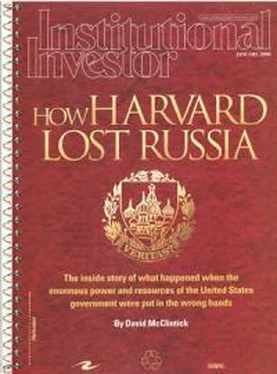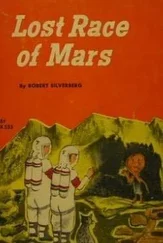Sachs called the Harvard general counsel's office, then notified the university's second-in-command, provost Albert Carnesale, who had been running Harvard with unusual authority for two years, since illness had sapped president Rudenstine's capacity. Then he called his old rival.
According to Sachs' testimony, Shleifer tried to portray the investigation as a "vendetta" orchestrated by "enemies" of Harvard, competing universities that had bid for the Russia job and lost.
Sachs was furious, later telling a federal grand jury his opinion of Shleifer's illicit investments: "Mr. Shleifer would be doing a disservice and would be entering a conflict of interest to make an investment like this. . . . I would find such investments to be highly inappropriate. . . . It would be damaging to HIID to engage in this kind of behavior while serving as an HIID consultant or employee to Russia."
WHEN HAY LEARNED OF THE investigation, he immediately called Butler. "Something funny is going on," he said. "You may need to get involved." Together they called Poppe at the Harvard general counsel's office. Poppe, who had just been notified of the investigation by Sachs, asked that Butler represent Harvard, HIID, Shleifer and Hay in any contacts with AID investigators.
Hay, Hebert and Zagachin scrambled. There was the matter of the loan that Hebert had arranged for Hay's father to make to Zagachin the previous August. Zagachin telephoned one of Aldrich's aides at AEW and asked if the funds earmarked for FRSD could be transferred immediately -- and if the amount could be doubled, to $400,000, in exchange for a larger piece of the company and better terms. Aldrich authorized the transfer of the funds to Zagachin. She instantly wired the money to Hebert, who passed it on to Dr. Hay in Idaho. A few days later AEW proceeded with its Pallada investment, paying $50,000 for 2 percent of the company.
With his university's reputation at stake, Carnesale demanded that the U.S. government put its charges in writing. On April 17, AID faxed a letter to Sachs stating that a senior HIID official in Moscow had a close relationship with the manager of a Russian mutual fund company and "may have used his or her position to seek preferential treatment for this mutual fund and the fund's specialized depository." The letter also alleged that "some USAID funding may have been used for the personal gain of one or more HIID employees" and insisted that Harvard people submit to interrogation by U.S. agents.
Hay fired back from Moscow. He drafted an angry letter for Vasiliev to send to AID mission director Ballantyne, denouncing the investigation as "deeply insulting," "crude" and "a violation of elementary norms of courtesy." The letter stated that Hay had no financial interest in either Pallada or FRSD.
Vasiliev dispatched another outraged, Hay-written letter to Richard Morningstar, who, as a special ambassador, advised the White House and the State Department on U.S. aid to the states of the former Soviet Union. The letter asserted that FRSD "has received private financing from a well-known trustee for pension funds," meaning Aldrich in Boston. He did not say that the financing had been in place for only a week. He did, however, warn of possible dire consequences to Russian-American relations as a result of the AID investigation.
From Cambridge, Sachs asked all HIID employees in Moscow to cooperate fully with the investigation.
On April 30 special agents Philip Rodonkanakis and Mary O'Mara interrogated Hay for three hours and 20 minutes in the mission director's conference room at the AID offices in Moscow, with Butler at his side.
Over the next few days, Shleifer called around Moscow trying to find out what the HIID staff was telling the investigators. A few people believed the Resource Secretariat's Holly Nielsen had been responsible for sparking the investigation. Shleifer ordered that she be fired. Nielsen informed Sachs, who countermanded the order. Shleifer reinstated it. "I'm running this project, and you'll do what I say," he told Rachel Glennerster, the Cambridge-based administrator in charge of contracts. She informed Sachs, who again reinstated Nielsen.
Nielsen couldn't be fired, but she could be restrained. Vasiliev ordered the security guards to bar her from the offices of the Resource Secretariat.
On May 9, Sachs asked Carnesale to fire Hay and to suspend Shleifer from the Russia Project. Not knowing this, a distraught Shleifer that same day let loose an extraordinary nine-page diatribe to the provost, calling the U.S. investigation "zealous," "outrageous" and "vicious," with the objective of "getting" him, Hay and Harvard.
Shleifer asserted that there was "no evidence of wrongdoing by myself and Hay." He oddly and grandiosely insisted that Carnesale cancel the entire Russia program: "It is a great time for Harvard to send [AID] straight to hell."
On May 19, Anatoly Chubais, who had become first deputy prime minister of Russia, dispatched a letter to AID administrator J. Brian Atwood in Washington demanding that he terminate HIID programs in Russia. The next day AID summarily killed the Russia Project, initiated five years earlier with such hope and intellectual heft. HIID had spent upward of $40 million of U.S. government funds and controlled the spending of an additional $350 million by other contractors.
The official letter, which the agency faxed to Sachs from Moscow, contained strong language unusual for a federal agency. Shleifer and Hay, AID charged, "have abused the trust of the United States Government by using personal relationships . . . for private gain. . . . USAID has been trying to explain to key Russian Government counterparts the value of open and transparent processes, and the importance of avoiding conflicts of interest, as ways to increase investor confidence in the Russian capital markets. . . . The private activities of [Hay and Shleifer], supported by staff and equipment paid for with U.S. Government funds, conveys exactly the wrong message to the Russians." On May 21 the Committee of Fellows of the Harvard Institute for International Development met twice in emergency session and crafted a letter to university president Rudenstine "expressing our dismay and concern," castigating Shleifer and Hay and urging that they be suspended. "Nothing less than HIID's integrity and ability to function effectively in the future is at stake," the letter stated.
In lower Manhattan that morning, Richard Bernard sent a memorandum to his boss, New York Stock Exchange CEO Richard Grasso, commenting on the coverage of Harvard's problems that day in the Wall Street Journal . "On a personal level," Bernard wrote, "it is hard not to rejoice in seeing Shleifer and Hay get their comeuppance. However, I am concerned about the possible ramification of the scandal for the good work that we did manage to accomplish."
Harvard fired Shleifer and Hay from their HIID positions the next day. Shleifer, however, retained his tenured professorship in the department of economics.
THE REVELATIONS FROM MOSCOW shocked no one more than Peter Aldrich, who invited Shleifer to dine at their usual haunt, Henrietta's Table in the Charles Hotel. Shleifer tried to shift the blame. "I've been hung out to dry," he railed. "I was just a consultant. It was Jeffrey's [Sachs] program, and he ran it."
Aldrich later telephoned Vasiliev in Moscow, who defended Hay. "Jonathan has been a tremendously valued adviser," Vasiliev said. "He's the only good money the U.S. government has spent. This is a political vendetta by the Central Bank against me and especially Chubais. The bank wants control of the securities market."
Hay visited Boston in late May in an effort to defend himself. He met with Sachs and Dwight Perkins, the senior professor who had run HIID for 15 years and had approved the hiring of Hay in 1992.
Читать дальше






![Джонатан Димблби - Barbarossa - How Hitler Lost the War [calibre]](/books/385421/dzhonatan-dimblbi-barbarossa-how-hitler-lost-the-w-thumb.webp)





